Sorting by "Updated at"
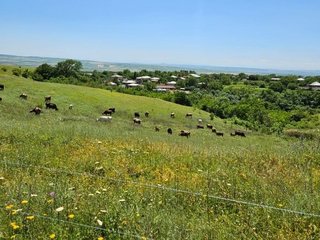
Controlled Grazing [Грузия]
“Controlled Grazing” seeks to harness the behaviours and habits of ruminant livestock to enhance three key ecological functions, namely the removal of plant biomass (grazing), soil and vegetation disturbance (animal impact) and increased nutrient cycling (dung and urine), with the goal of increasing perennial grass establishment, pasture palatability and reducing bare ground and erosion.
- Составитель:
- Nicholas Euan Sharpe
- First published:
- 2026-01-09 12:45
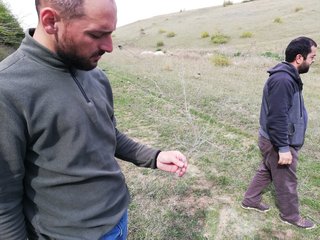
Participatory Grassland and Rangeland Assessment (PRAGA) [Грузия]
The Participatory Rangelands and Grasslands Assessment Methodology (PRAGA) is a rapid, cost-effective framework for the integrated assessment of rangeland ecosystems, incorporating diverse data sources and participatory approaches. PRAGA facilitates stakeholder engagement through consultations and workshops, underpinned by community-based mapping of grazing areas, land use dynamics, and trend analyses.
- Составитель:
- Nicholas Euan Sharpe
- First published:
- 2025-12-16 08:26
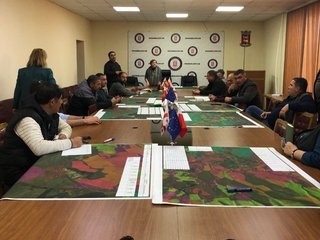
Municipal Pastureland Planning [Грузия]
The Municipal Pastureland Planning approach was developed collaboratively with key national and local stakeholders to establish a structured, evidence-based decision support framework for sustainable rangeland governance. This system consolidates and presents data from diverse stakeholder groups in a format fully compatible with the Land Degradation Neutrality Framework, ensuring that planning aligns with both environmental and socio-economic objectives.
- Составитель:
- Nicholas Euan Sharpe
- First published:
- 2025-12-16 08:26
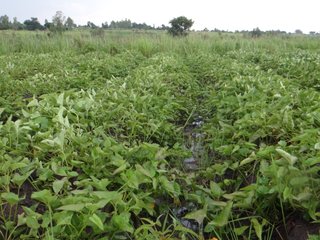
Potatoes Growing in Lowlands for Food Security Durnig Dry Seasons [Уганда]
Lowlands have relatively high water tables and contain sufficient soil moisture to permit potatoes growing. Potatoes can grow in such areas compared to other staple crops like cassava.
- Составитель:
- Bernard Fungo
- First published:
- 2020-05-14 17:04
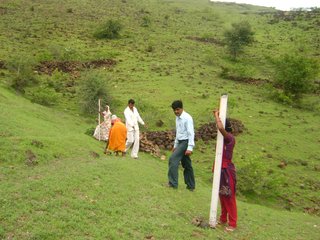
Participatory Net Planning for Sustainable Watershed Management [Индия]
Participatory Net Planning (PNP) is a practical methodology that actively engages landowners and local stakeholders in planning and implementing measures for land use, soil conservation, water harvesting, and biomass development. It aims to regenerate ecosystems and improve the sustainability of watersheds through site-specific resource management. PNP emphasizes the conservation, productivity enhancement, and sustainable use of natural and biological resources. It involves assessing the current condition and use of land, water, and vegetation, and preparing detailed plans—with estimated costs and timelines—to achieve the desired outcomes. In Participatory Net Planning (PNP), the term “Net” represents a complete and interconnected planning framework where every land parcel within a watershed is individually assessed and linked to the larger watershed system. It highlights a network-based approach that integrates soil, water, vegetation, and community needs, ensuring that interventions on one farm support resource conservation and productivity across neighboring and downstream lands. Overall, it signifies a holistic and coordinated system where all stakeholders and resources are planned collectively for sustainable and long-term watershed management.
- Составитель:
- Arun Bhagat
- Создание:
- 2025-10-07 10:31
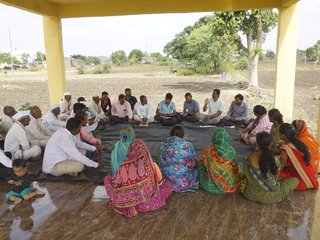
Ecosystem based Adaptation (EbA) through Farmers’ Collectives for Sustainable Management of Natural Resources [Индия]
The Ecosystem-based Adaptation (EbA) with Farmer Collective (henceforth Farmer Producer Organisations (FPOs)) approach strengthens farmers’ resilience to climate change by integrating sustainable water- and land management, biodiversity enhancement and resources governance within farmers’ collectives. Implemented in semi-arid regions of Maharashtra and Telangana, the approach combines capacity building, improving soil health, through women-led green business aiming at enabling eco-sensitive and economically viable FPOs.
- Составитель:
- Arun Bhagat
- First published:
- 2025-11-30 12:40
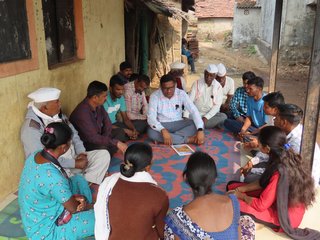
Capacity Building Process for Participatory Watershed Development [Индия]
The Capacity Building Process for Participatory Watershed Development is a structured approach to strengthen the technical, managerial, and social skills of Non-Governmental Organizations (NGOs), Partner Implementation Agencies (PIAs), and Village-level Institutions (VIs). It includes orientation, training, participatory tools, mentoring, exposure visits, monitoring, and institutionalization. The process enhances competencies, fosters creativity and confidence, promotes community ownership, and ensures effective, sustainable planning, implementation, and management of watershed-based natural resource management and climate-resilient interventions.
- Составитель:
- Arun Bhagat
- Создание:
- 2025-10-09 11:35
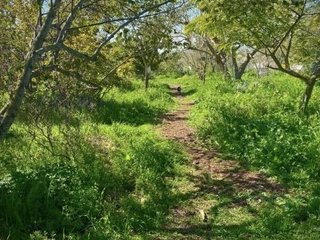
Conversion of conventional monoculture farmland into a food forest [Израиль]
Converting conventional monoculture farmland into a food forest-based agroforestry system restores soil health, increases vegetation cover, enhances biodiversity while diversifying production. The intervention improves soil organic matter and ecological resilience through multi-storey planting, reduced soil disturbance, and nature-based land management.
- Составитель:
- Tom Cohen
- First published:
- 2025-11-12 07:46
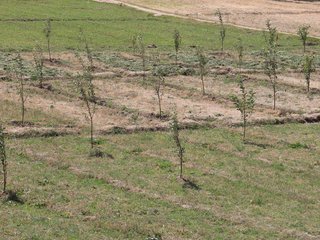
Agroforestry to improve soil fertility, water retention, and sustainable income for local communities [Афганистан]
The Agroforestry system in Malistan district combines traditional practices with support from the Community-Based Sustainable Land and Forest Management project in Afghanistan. This initiative provides technical support, training, and resources like apple trees, fertilizers, and alfalfa seeds to establish 400 orchards (1,000 m² each). The goal is to enhance community livelihoods by reducing dependence on rangelands, helping to preserve local ecosystems.
- Составитель:
- Ahmad Zia Jalalzai
- First published:
- 2025-11-04 09:08
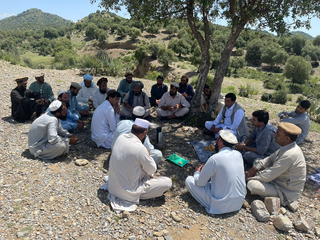
Stakeholder collaboration for building Learning Site for landscape restoration [Афганистан]
To raise awareness and ensure clear role delineation, a series of consultations were held with the local community, the Forest Management/Rangeland Management (FM/RM) association, and other key stakeholders. Memorandum of Understanding (MoU) that formally outlined the roles and responsibilities of each party was signed. Additionally, the FM/RM association issued a letter of guarantee to support the establishment of a learning site dedicated to promoting best practices in forest and rangeland management. (e.g. cumin) through community’s own contributions.
- Составитель:
- Mohammad Arif
- First published:
- 2025-10-17 14:46
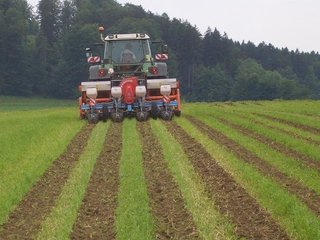
Maize strip tillage [Швейцария]
A cropping system for maize which reduces the reworking of the soil to the stripes, in which the seeds are planted.
- Составитель:
- Roman Wyler
- First published:
- 2017-03-09 14:31
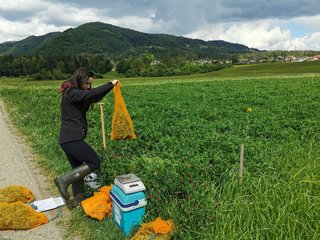
Crimson clover as an overwintering cover crop for nitrogen supply [Словения]
Crimson clover, overwintered as a cover crop, forms a symbiotic relationship with nitrogen-fixing bacteria, capturing nitrogen and thus enriching the soil. This helps reduce the need for synthetic fertilizers and aids in soil erosion control, weed suppression, and improved soil structure.
- Составитель:
- Tamara Korošec
- Создание:
- 2025-03-19 12:14
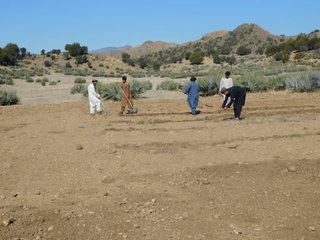
Learning Site to promote Sustainable Land and Forest Management Practices in Khost [Афганистан]
The learning site incorporates several key elements of the technology including a solar-powered water lifting system, three reservoirs and an adopted irrigation system. It features demonstration plots for various initiatives, such as tree planting (walnut, almond, pomegranate and mulberry, the cultivation of fodder (alfalfal Mazari palm) and and medicinal plants (e,g, cumin), and a nursery (walnut) established through the community’s own contributions.
- Составитель:
- Mohammad Arif
- First published:
- 2025-10-17 14:46
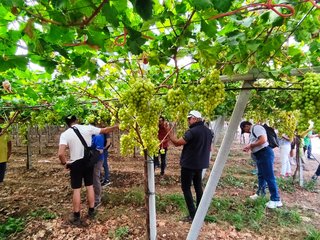
Organic Farming of Table Grapes [Италия]
Organic Farming (OF) of table grape production in Apulia region is estimated at 8.5% of the total area. The advantages of OF include an increase in soil organic matter, better water holding capacity and lower soil salinity.
- Составитель:
- Pandi Zdruli
- First published:
- 2025-10-16 13:56
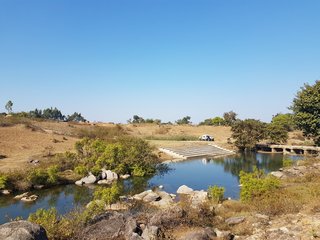
Experiential Learning Tools for Sustainable Water Management [Индия]
The project “Scaling up experiential learning tools for sustainable water governance in India” aimed at enhancing sustainable water management at scale by improving the capacities of 1,500 rural communities covering 105,000 households directly and 2,000 communities covering 140,000 households indirectly in six Indian states to manage water more sustainably. This was achieved through experiential learning from collective action games, structured community debriefings, and participatory water planning tools that contribute to greater awareness and improved governance, inducing behavioural change toward more sustainable water governance and management. The work was jointly conducted by the Foundation for Ecological Security, India (FES), the International Food Policy Research Institute (IFPRI) and the International Crops Research Institute for the Semi-Arid Tropics (ICRISAT).
- Составитель:
- Vishwambhar Duche
- First published:
- 2025-03-26 23:13
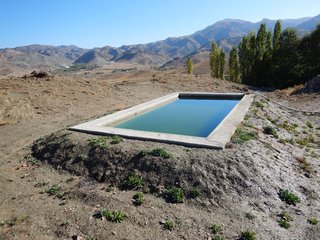
Gravity Irrigation for enhancing Community-Based Restoration efforts in the degraded forests of Paktya [Афганистан]
Using a gravity-irrigation system, spring water is diverted to fill reservoirs and then distributed to fields for the restoration of degraded forest areas, with the active involvement of local communities and a focus on the sustainable use of water resources (spring water).
- Составитель:
- Mohammad Wazir Ahmadzai
- First published:
- 2025-10-17 14:46
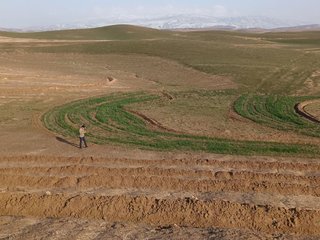
Контурные траншеи и контурные полосы [Узбекистан]
Контурные траншеи для возделывания миндальных деревьев и контурные полосы для зерновых культур являются разновидностями сооружений по сбору дождевой воды. Их назначение — улавливать сток, снижать эрозию и повышать влажность почвы, тем самым повышая продуктивность земель и способствуя развитию климатически устойчивого земледелия в засушливых низинных районах.
- Составитель:
- Joren Verbist
- First published:
- 2025-07-09 17:31
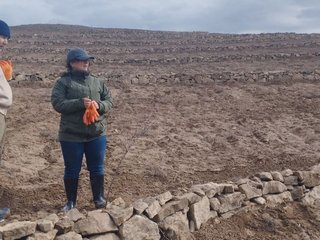
Плодовые террасы-ступени (градони) [Узбекистан]
Садовые террасы типа «градони» представляют собой прерывистые полосы контурных сооружений, разделённые водосборными участками длиной около 10 метров. Они предназначены для улавливания и удержания дождевой воды, снижения эрозии и улучшения условий для выращивания (в данном случае) миндальных и фисташковых деревьев, тем самым повышая продуктивность земель и устойчивость к изменениям климата в засушливых районах.
- Составитель:
- Joren Verbist
- First published:
- 2025-07-09 17:31
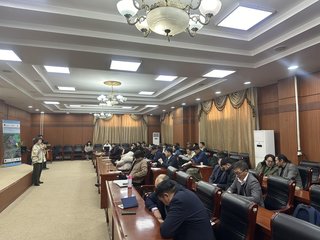
Mentorship programme on conservation agriculture [Монголия]
The Approach aims to ensure the sustainability of the agricultural sector by training and mentoring young farmers in conservation agriculture to improve soil fertility and health and maintain productivity.
- Составитель:
- Otgontsetseg Davaanyam
- First published:
- 2024-06-26 18:52
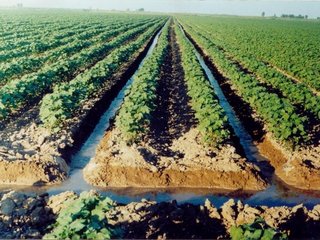
Водосберегающие технологии при возделывании хлопчатника в Южном Казахстане [Казахстан]
Технология полива по бороздам позволяет снизить расчетные (рекомендуемые) размеры поливных норм до 30%, сохраняет плодородие почвы.
- Составитель:
- Unknown User
- First published:
- 2017-05-26 11:32
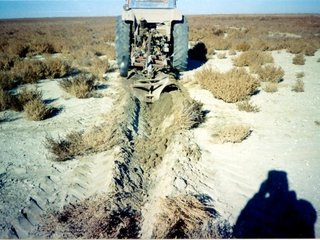
Технология закрепления грунтов осушенного дна Аральского моря [Казахстан]
Технология закрепления грунтов осушенного дна Аральского моря
- Составитель:
- Vladimir Kaverin
- First published:
- 2017-05-25 17:10
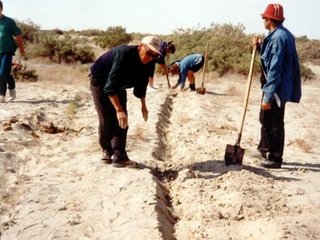
Создание мелиоративных насаждений для борьбы с эрозией [Казахстан]
Технология создания мелиоративных насаждений для борьбы с ветровой и водной эрозией
- Составитель:
- Vladimir Kaverin
- First published:
- 2017-06-01 15:14
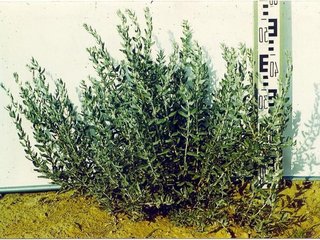
Создание искусственного пастбищного фитоценоза в северной пустынной подзоне [Казахстан]
Селекция кормовых растений и технология их возделывания для максимального использования низкой почвенной влаги в условиях пустыни
- Составитель:
- Unknown User
- First published:
- 2017-05-26 13:50
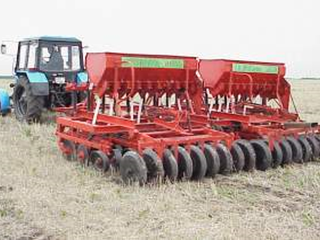
Ресурсосберегающее земледелие для производства зерновых культур в богарных районах Казахстана [Казахстан]
Ресурсосберегающее земледелие, применяемое в Северном Казахстане, основано на технологии прямого посева зерновых культур без обработки почвы в условиях постоянного покрытия её поверхности растительными остатками. Такой подход способствует остановке и обращению процессов деградации почв, повышению эффективности использования водных ресурсов и увеличению урожайности сельскохозяйственных культур на богарных землях.
- Составитель:
- Kulyash Iskandarova
- First published:
- 2020-03-09 14:59
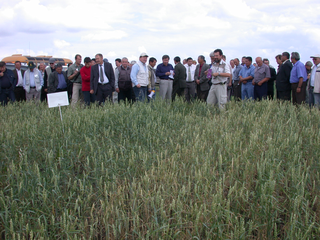
Повышение осведомленности об устойчивом управлении земельными ресурсами с использованием ресурсосберегающего сельского хозяйства [Казахстан]
Повышение осведомленности и укрепление возможностей и навыков фермеров, специалистов по сельскому хозяйству и исследователей в разработке и внедрении ресурсосберегающих, прибыльных и экологически чистых методов производства зерновых культур с использованием методов ресурсосберегающего земледелия.
- Составитель:
- Kulyash Iskandarova
- First published:
- 2020-03-10 09:39
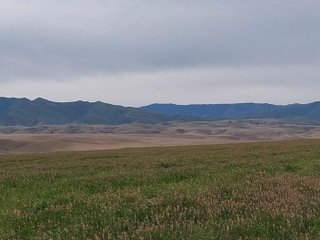
Создание сеяных культурных пастбищ летне-осеннего использования в условиях предгорной зоны юго-востока Казахстана [Казахстан]
Создание культурных пастбищ летне-осеннего использования с посевом многолетних засухоустойчивых кормовых культур (эспарцет под покров ячменя - летнего использования, изень - осеннего использования) в условиях предгорной зоны юго-востока Казахстана
- Составитель:
- Kulyash Iskandarova
- First published:
- 2023-07-12 17:05
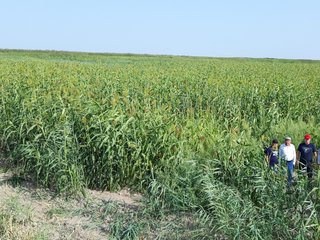
Введение сахарного сорго в рисовые севообороты для восстановления деградированных засоленных земель и диверсификации сельскохозяйственного производства [Казахстан]
Введение сахарного сорго в рисовые севообороты - один из способов восстановления деградированных земель в условиях дефицита оросительной воды и вторичного засоления почв, а также диверсификации направлений сельскохозяйственного производства местных сообществ путем создания прочной кормовой базы для животноводства.
- Составитель:
- Kulyash Iskandarova
- First published:
- 2023-03-29 09:08
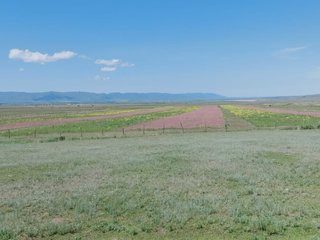
Коренное улучшение низкопродуктивных пастбищ путем полосного размещения многолетних засухоустойчивых трав в условиях предгорно-полупустынной зоны юго-востока Казахстана [Казахстан]
Коренное улучшение низкопродуктивных пастбищ путем полосного размещения многолетних засухоустойчивых трав в условиях предгорно-полупустынной зоны юго-востока Казахстана
- Составитель:
- Kulyash Iskandarova
- First published:
- 2023-02-24 12:17
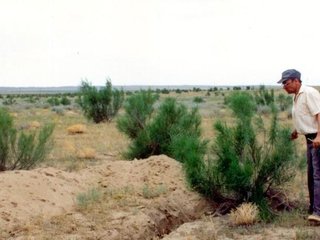
Создание саксаульных пастбищезащитных полос в северной пустыне. [Казахстан]
Локализация эрозионных процессов и накопление влаги путем создания саксаульных полос на пастбищах северной пустыни
- Составитель:
- Unknown User
- First published:
- 2017-05-25 17:59
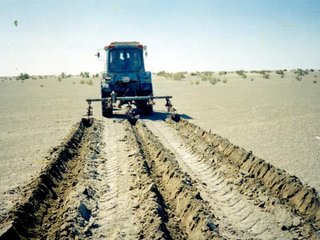
Подход закрепления бороздами супесчаных и песчаных почв осушенного дна Аральского моря. [Казахстан]
Подход бороздкового закрепления супесчаных и песчаных почв осушенного дна Аральского моря.
- Составитель:
- Vladimir Kaverin
- First published:
- 2017-07-17 15:04
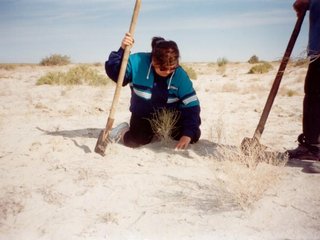
Принцип размещения фитомелиорантов в выемках на пастбищных землях пустынной зоны [Казахстан]
Принцип размещения фитомелиорантов в выемках на пастбищных землях пустынной зоны Казахстана с целью накопления дополнительной влаги и защиты территории от ветровой эрозии.
- Составитель:
- Unknown User
- First published:
- 2017-07-17 15:21
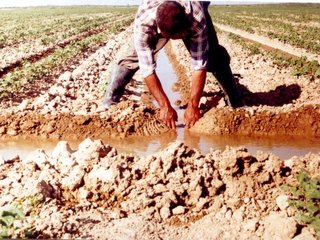
Полив через борозду [Казахстан]
Полив через борозду
- Составитель:
- Unknown User
- First published:
- 2017-07-17 15:39
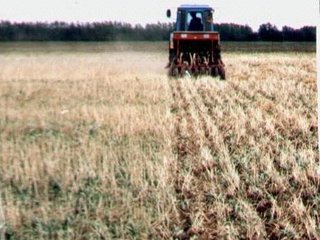
Выращивание культур по стерневому фону [Казахстан]
Стерневой посев для возделывания зерновых культур (яровой пшеницы).
- Составитель:
- Ervin Gossen
- First published:
- 2017-07-17 16:04
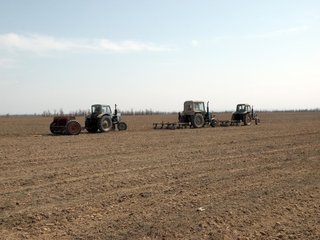
Рекультивация залежей методом прямого подсева (без обработки почвы) [Казахстан]
Восстановление залежей для производства кормов сочетается с сохранением биоразнообразия естественной степной растительности путем нулевой обработки почвы с дисковым боронованием и посевом кормовых трав с низкой плотностью.
- Составитель:
- Heino Hertel
- First published:
- 2017-05-28 17:21
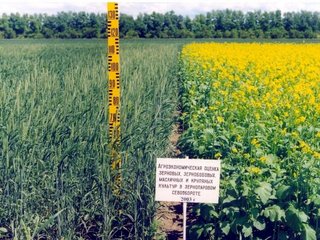
Почвозащитная минимальная технология обработки почвы и посева [Казахстан]
Минимальная обработка почвы под возделывание зерновых культур (вторая и третья культура после пара).
- Составитель:
- Ervin Gossen
- First published:
- 2017-05-26 12:05
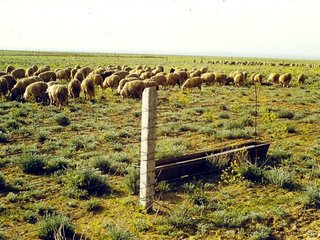
Создание сеяных пастбищ из полукустарников и разнотравья способствует максимальному использованию скудных водных ресурсов [Казахстан]
Повышение эффективности использования ограниченных ресурсов почвенной влаги в пустыне при посеве ксерофитных кормовых растений
- Составитель:
- Irina Skorintseva
- First published:
- 2017-07-17 17:38
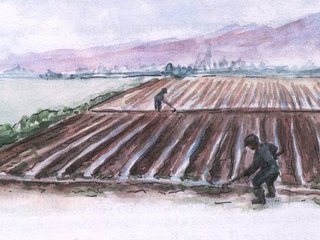
Полив по укороченным бороздам и регламентированное использование минеральных удобрений [Узбекистан]
Ресурсосберегающая технология орошения пропашных сельхозкультур по укороченным бороздам, способствующая значительной экономии оросительной воды и эффективности использования минеральных удобрений на орошаемых землях.
- Составитель:
- Oyture Anarbekov
- First published:
- 2017-08-02 23:56
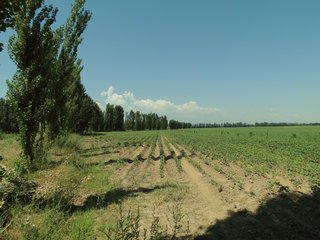
Лесные ветрозащитные полосы, применяемые в орошаемом земледелии в Центральной Азии [Киргизия]
Ветрозащитные полосы из тополя (Populus nigra pyramidalis) являются важной агролесомелиоративной системой в орошаемом земледелии Центральной Азии. Такие полосы снижают общее водопотребление в орошаемом земледелии на 10–20% и увеличивают доход фермерских хозяйств на 10–15%.
- Составитель:
- Niels Thevs
- First published:
- 2021-05-18 14:09
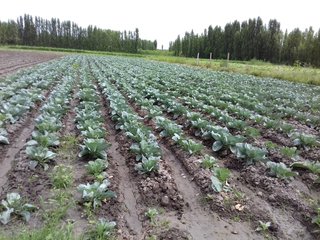
Применение севооборота сельскохозяйственных культур в условиях фермерского хозяйства [Киргизия]
Организация севооборотов как путь эффективного использования земель с учетом экономических интересов землевладельцев и землепользователей, а также экологических и экономических факторов.
- Составитель:
- Dzhumabaeva Salamatkhan
- First published:
- 2019-09-23 09:21
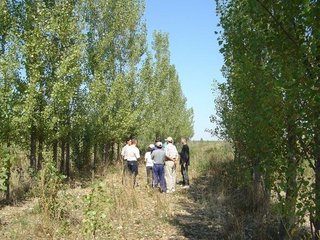
Тополя в качестве биодренажа [Киргизия]
Тополя высаживаются в целью понижения уровня грунтовых вод и снижения засоления на площадях, где ирригационные и дренажные системы пришли в упадок; между рядами деревьев выращивается люцерна.
- Составитель:
- Abdybek Asanaliev
- First published:
- 2017-04-28 10:41
- . . .